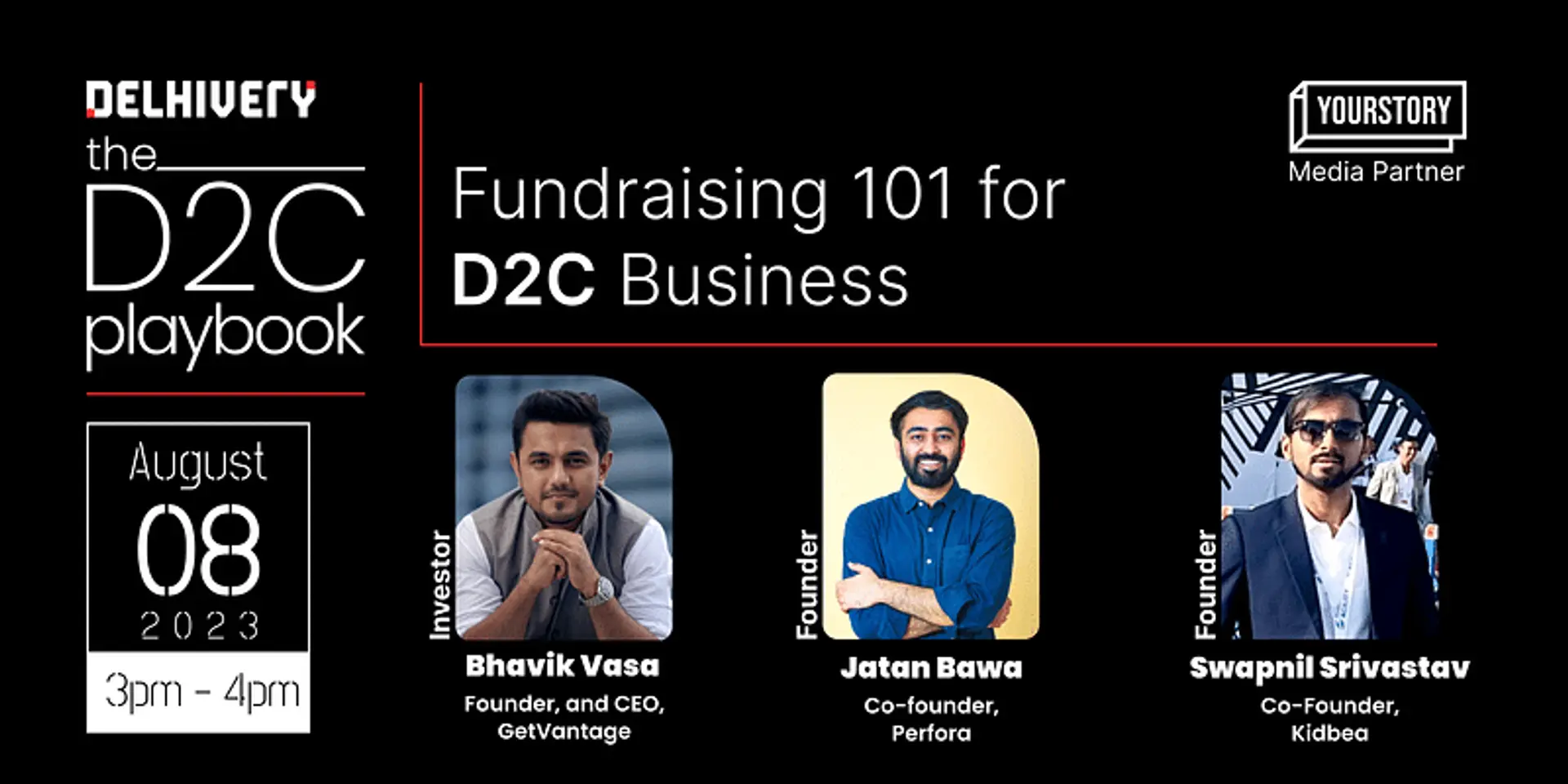
Delhivery
View Brand PublisherThe D2C Playbook: Experts decode the A to Z of fundraising for a balanced growth
Entrepreneurs and investors get together to talk about key aspects of fundraising such as identifying the best time to raise funds, understanding various forms of fundraise, identifying the right investor, and more.
“Any entrepreneur-investor relationship is also a relationship of equals and a relationship of two humans. So it's important to be transparent, vulnerable, and candid,” said Jatan Bawa, Co-founder, Perfora, while speaking on a live panel discussion on ‘Fundraising 101 for D2C business’.
The session was co-hosted by Delhivery and YourStory under their ongoing initiative - The D2C Playbook. Bhavik Vasa, Founder and CEO, Getvantage, and Swapnil Srivastav, Co-founder, Kidbea, were also a part of the session.
“An entrepreneur needs to fine-tune multiple issues when they start a business. Find a solution for the first five, then raise one round, and solve for the next five issues. So, you're basically reducing your probability of failure through these rounds. Sometimes there’s a reverse temptation to keep raising multiple rounds in a single year, and we’ve seen many businesses that raised a lot of capital too soon and weren’t able to live up to that growth,” said Vasa, stressing on the concept of balanced business growth and adopting a balanced approach towards raising different forms of capital at different phases.
He also spoke at length about equity and quasi equity fundraising. Debunking the myth that the word funding is only associated with equity fundraise, he reiterated that founders should be aware and smart about alternative forms of capital such as quasi equity, which means that they can take short-term working capital or some form of venture debt without giving away their equity.
“If you're very early in your business journey, you don't need to go for an institutional round. You can do a friends and family round for the small first cheques. There are many angel platforms too; crowdfunding is another option,” he added, reassuring emerging entrepreneurs that there is enough capital for new ideas at a very early stage and that they should not worry about any funding slowdowns.
When is the right time to raise funds?
Vasa said founders should understand the potential usage of the money they are seeking to raise. “Ask yourself, what do you need and how will you use it, and you’ll be able to make an informed decision. Don’t fall for the glamour or notion of attaching your success to the amount of money you’ve raised,” Vasa said.
With Perfora, Bawa identified the need for early capital to create brand awareness and build a distribution network. They raised an early first round with the intention of accomplishing product-market fit.
Deriving from his own experience, Bawa spoke candidly about the importance of understanding your product and its potential. “With respect to raising capital, the first and foremost thing is to understand what it is that you're trying to solve. How relevant and big is that problem? Have clarity about what you want to accomplish and the kind of impact you want to create through your brand,” said Bawa, adding that a founder shouldn’t raise too much capital or be fussy about the valuation.
He also said media coverage around funding does give a founder “a lot of dopamine”, but “that’s for a few moments and dilution is permanent. So, founders need to be very cognisant of overall dilution.”
Identifying the right investor
Kidbea’s Swapnil Srivastav expressed his views on the importance of understanding the right type of investor for your startup. “If you are a D2C founder, you cannot onboard a fintech investor. So, you have to be very cautious while onboarding investors because you [don’t only need them for the money] but you also need your investors or VC firms for their networks, mentorship, and many other aspects,” he said.
He suggested a growth hack that he has used with his own brand wherein he encouraged entrepreneurs to send samples of their products to their target investors. “We sent samples to many investors who we feel are interested in our brand. We offer bamboo-based products so touch and feel [helps] know the brand better and experience the quality.”
Vasa suggested that entrepreneurs should also do their due diligence on investors, “It should not just be one way, because if you end up raising money, it is going to be a long-term marriage of sorts.”
He also mentioned that some funds do take a position that they don't want to invest in multiple brands from the same category. However, a few understand that India is a unique market and two brands can build the same category differently.
“Don't be afraid to go on that first call with that investor and ask them about their thoughts on investing in a similar startup. And if you don't get a very comforting answer and are not confident, avoid sharing more details,” Vasa said.
Other takeaways
Bawa stated that raising capital should be a very conscious choice “because you have to return that money at some point, and it is your responsibility as a founder to make sure that those returns are happening somewhere down the line”. He stressed on raising limited and sufficient capital, and making the best use of it.
Building on the trust factor, Vasa urged entrepreneurs to be authentic. “It is okay if you don't have to have all the answers, as long as you can get back to them with the right inputs in time,” he said, highlighting that entrepreneurs need to stay optimistic.
“Let me share with you that we, as investors, also have to face rejection and get asked tough questions by large investors who we raise capital from,” he said, advising emerging and new entrepreneurs to see rejections as learnings more than failures.
All speakers reiterated that founders should always save for difficult days. “You should have sufficient runway in your bank account before you're going out and raising more money because lack of money is a big distraction. Have anywhere between six to nine months of capital in the bank because you're not sure how long it will take for you to raise money. There are multiple factors at play,” Bawa said.
Suggesting an easy hack, Vasa said, “Every time you raise some capital, especially equity capital, park 10-15% of it in an FD. This is your rainy day money. When you go for the next round of funding, and if you are really low on cash, it's going to be counterintuitive on your negotiation as well.”







